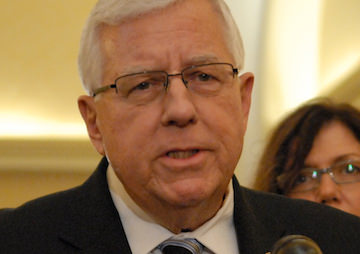An Accounting Trick Is the Basis of Phony Claim That U.S. Faces a Public-Sector Debt Crisis
Senate Budget Committee Chairman Mike Enzi's claim that "rapidly growing public sector debt threatens America's economic future" is based on dishonest accounting rigged by congressional austerity hawks, reports The Nation. Sen. Mike Enzi. (AMSF2011 / CC BY 2.0)
Sen. Mike Enzi. (AMSF2011 / CC BY 2.0)
Senate Budget Committee Chairman Mike Enzi’s claim that “rapidly growing public sector debt threatens America’s economic future” is based on dishonest accounting rigged by congressional austerity hawks, reports Ari Rabin-Havt, host of the SiriusXM Progress 127 radio show “The Agenda,” at The Nation:
The numbers relied upon by Enzi and far too many others inside the Beltway, including the Congressional Budget Office itself, are completely bogus. The methodology used by the CBO to create these projections exaggerates the federal government’s long-term debt projection by as much as 440 percent, creating a phony fiscal crisis where none exists.
In reality, data provided to The Nation by Stephen Goss, chief actuary of the Social Security Administration, shows that starting in 2032 the federal government’s debt held by the public is on track to rapidly decline as a share of GDP, bottoming out at 40 percent. This is in stark contrast to the CBO’s sharply rising debt-to-GDP ratio, which peaks at 176 percent in 2090.
How can there be such a large discrepancy in the numbers? The answer is fairly simple. The CBO assumes that Social Security and Medicare Part A will draw on the general fund of the U.S. Treasury to cover benefit shortfalls following the depletion of their trust funds, which at the current rate will occur in 2034. …
… CBO projections disregard the actual law and assume a worst-case legislative scenario—and one that is politically unlikely to boot. It’s hard to imagine Congress would simply leave the problem alone and watch Social Security and Medicare Part A devour the nation’s budget. …
The CBO hasn’t gone rogue here, but rather it’s acting under order of Congress. The CBO confirmed to The Nation that its scoring convention is based on Section 257(b)(1) of the Balanced Budget and Emergency Deficit Control Act of 1985, which states that “funding for entitlement authority is assumed to be adequate to make all payments required by those laws.”
“To get at the real picture, Congress could and should simply ask the CBO to correctly score these numbers, or at least note that this score is not consistent with current law,” concludes Rabin-Havt. “That would remove a central talking point for austerity hawks who seek deep cuts in federal spending. … In the meantime, we need to realize that there really is no debt crisis.”
— Posted by Alexander Reed Kelly.
Your support matters…Independent journalism is under threat and overshadowed by heavily funded mainstream media.
You can help level the playing field. Become a member.
Your tax-deductible contribution keeps us digging beneath the headlines to give you thought-provoking, investigative reporting and analysis that unearths what's really happening- without compromise.
Give today to support our courageous, independent journalists.






You need to be a supporter to comment.
There are currently no responses to this article.
Be the first to respond.